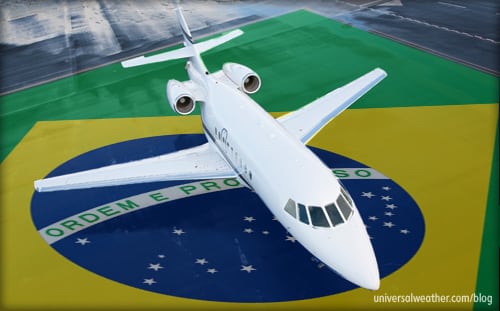General Overview of GA Airport Operations and Security in Brazil


This business aviation blog post is part of a series on operating to Brazil.
Generally speaking, airport availability, infrastructure, and services in Brazil are of a high quality for business jet operators. Airport restrictions are not onerous. However, challenges do exist, such as aircraft parking availability.
Before flying into Brazil, here is a general overview of what you need to know about local airport operations and security:
1. Airport curfews and noise restrictions in Brazil
Curfews may be in effect at different airports in Brazil. However, large international airports usually operate 24-hours a day. It’s recommended that prior notice is provided to your ground handler to ensure that the services requested have been confirmed and are ready for your arrival. Check on operating hours when planning flights to domestic (non-airport of entry) airports in Brazil. For example, Santos Dumont, Rio de Janeiro, Brazil (SBRJ) is open 0600– 2300 local with no overtime possible. Congonhas, Sao Paulo, Brazil (SBSP) operates 0500 – 2300 local with restrictions to certain aircraft types between 0600-0659 local and 2201-2300 local. Noise restrictions aren’t prevalent in Brazil, but there are exceptions.
2. Special airport restrictions
Airports like Manaus, Brazil (SBEG) can be very busy with commercial operations at certain times. While general aviation (GA) aircraft will be permitted to land during these peak hours – usually 1530 to 1900 (UTC) — you may have to wait for customs, immigrations and quarantine (CIQ) to complete commercial airline clearances first. It’s best to avoid peak times. Airport construction advisories are by NOTAM.
3. Aircraft parking challenges
Aircraft parking availability is the first consideration when looking at an extended stay in Brazil, particularly at Campinas, Sao Paulo (SBKP), but also at Guarulhos, Sao Paulo (SBGR), due to aircraft parking limitations and high traffic at the airports. Rio de Janeiro (SBGL) has parking restrictions during certain times of the year, such as the Brazilian Carnival. Scheduled commercial operations take priority over general aviation (GA) at airports in Brazil. Commercial-traffic volume is growing 20-30% per year, and this puts a strain on GA parking. If aircraft parking is an issue at your desired airport, it’s recommended to obtain Plan “B” and possibly Plan “C” options from your ground handler for alternate parking or to drop passengers and reposition.
4. Moving and relocating aircraft on the field
The short answer is no. In Brazil, crew must always be notified before an aircraft is moved. Any aircraft movement must have a mechanic or pilot onboard. INFRAERO¸ a Brazilian government corporation responsible for operating the main Brazilian commercial airports, prefers that GA aircraft leave under their own power, rather than utilizing a towbar, and will park you in such a way to facilitate this. However, we recommend confirming towbar requirements with your ground handler for each planned destination within Brazil.
5. Aircraft parking, hangar availability, and general runway/taxiway conditions
Most airports in Brazil have specified parking areas for GA administered by INFRAERO. SBKP, for example, has only three to four designated GA parking spots. A military ramp is available at SBGR for overflow parking with prior approval. Hangar space for corporate aircraft is generally not available in Brazil. Condition of tarmac, taxiways, and runways is good throughout Brazil.
6. Peak hours of operations to consider
Peak hours at major airports are usually 0600-0900 local and 1800-2100 local, although deviations exist from airport to airport. Avoid peak periods, as you may experience Air Traffic Control (ATC) holds and longer-than-normal taxi times.
7. Airport security
Airports in Brazil are secured by INFRAERO. Military airports have their own security. Although airport security and surveillance is adequate throughout Brazil, operators may arrange private security, if desired, for their aircraft. Keep in mind that armed guards are not permitted in restricted areas. Any additional security must be certified by the Civil Aviation Sector (ANAC), registered by airport management, and have a badge issued by INFRAERO. Luggage and passengers/crew are screened by x-ray. Off airport security can be set up via your ground handler. For security purposes, it’s recommended to avoid public taxis as well as rental vehicles.
Conclusion
When operating to Brazil, it’s best practice to confirm airport of entry curfews with your 3rd-party provider as well as operating hours of any domestic airports you intend to use. Always provide prior notice to your local ground handler for fuel uplifts and any other service requirements. While security is very good at Brazilian airports and not an issue of concern, securing airport parking can be a challenge. Particularly when planning operations to the Sao Paulo area, it’s important to confirm parking as early as possible.
Questions?
If you have any questions about this article, contact me at andrecamargo@universalaviation.aero.
Next week, we’ll discuss aircraft fueling considerations in Brazil.



